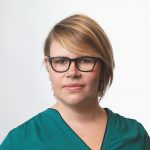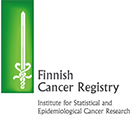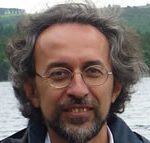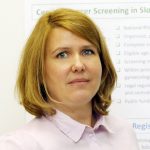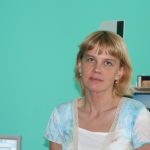Institute of Oncology Ljubljana
Institute of Oncology Ljubljana is a public health institution providing health services on the secondary and tertiary levels as well as performing educational and research activities in oncology in Slovenia. It was founded in 1938. As a principal national institution, the Institute supervises programs on the comprehensive management of cancer diseases in terms of prevention, early detection, diagnostics, treatment and rehabilitation, research and education.
Its unit Epidemiology and Cancer Registry consists of the Cancer Registry of the Republic of Slovenia (established in 1950), the Hospital-Based Cancer Registry of the Institute of Oncology Ljubljana, the epidemiology unit, and screening units with the registries ZORA (national organised cervical cancer screening program) and DORA (national organized breast cancer screening program).

Maja Primic Žakelj, Assoc. Prof.
is a cancer epidemiology specialist since 1991, doctor of science in the field of cancer epidemiology since 1995 and a public health specialist since 2010. She works at the Institute of Oncology Ljubljana for more than 30 years, where she is the head of the Epidemiology and Cancer Registries Unit since 2003; before the merging of both departments she was the head of the Epidemiology Unit since 1996. She is constantly upgrading her professional competences by attending postgraduate courses in Slovenia and abroad, not only in the field of cancer epidemiology, but also in the field of health management, statistics and information technologies.
Her main domain of research is cancer descriptive and analytical epidemiology, organisation of population-based organised cancer screening programs.
Urška Ivanuš
is a medical doctor with post-gradual specialisation in public health with emphasis on cancer epidemiology and cancer screening. She is a director of the Slovenian national cervical cancer screening programme and head of Department for cancer screening at the Institute of Oncology Ljubljana since 2018. She is leading an innovative project for the renewal of cervical cancer screening information system, which will on daily basis connect all professionals, involved in cervical cancer screening and will enable a risk-based management of women as well as computer-assisted clinical decisions. She is completing her PhD study on HPV-self sampling in non-responders.
Katja Jarm
graduated as medical doctor at the Universitiy of Ljubljana, Slovenia, and afterwards finished her specialisation as public health specialist in 2012. She works at the Institute of Oncology Ljubljana as an epidemiologist in Slovenian breast cancer screening programme DORA. She is involved in the managing unit for the roll-out process of national breast screening programme throughout the whole country.
Dominika Novak Mlakar
completed her studies at the Faculty of Medicine in Ljubljana in 1998. Since 2008 she has been a specialist in public health. She started her career in Community Health Centre Ljubljana where she has been actively involved in smoking cessation programs. Following examples from abroad, she established first Slovenian smoking cessation telephone counselling (helpline) in 2006.
In 2006, she participated in the preparation of documents for the establishment of the colorectal cancer screening programme, Program Svit, and has been involved in the programme implementation at the national level since 2009. Since 2009, she has been employed at the Institute of Public Health of the Republic of Slovenia, today the National Institute of Public Health. She is actively involved in Svit Program Central Unit coordination and works closely with colonoscopists and histopathologists involved in the implementation of the screening programme. In 2017, the Ministry of Health of the Republic of Slovenia nominated her as the colorectal cancer screening programme director.









